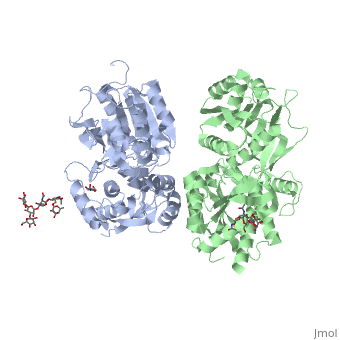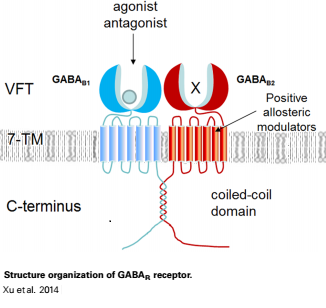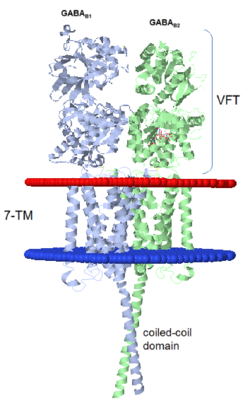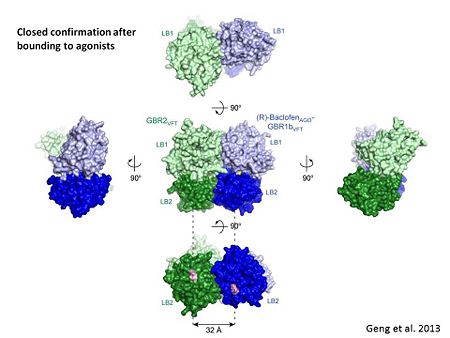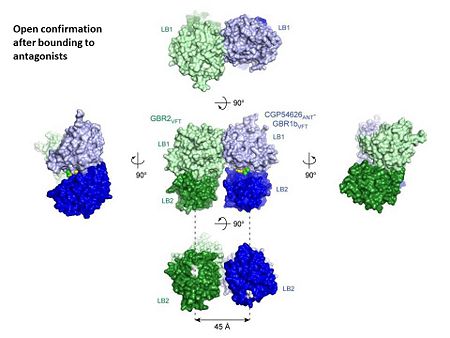User:Rana Saad/The human GABAb receptor
From Proteopedia
(Difference between revisions)
| Line 2: | Line 2: | ||
[[Image:Gabab.xu2014.png |thumb|400px]] | [[Image:Gabab.xu2014.png |thumb|400px]] | ||
=='''''Introduction'''''== | =='''''Introduction'''''== | ||
| - | [https://en.wikipedia.org/wiki/Gamma-Aminobutyric_acid γ-Aminobutyric acid (GABA)] is the major inhibitory [http://en.wikipedia.org/wiki/Neurotransmitter neurotransmitter] in the central nervous system (CNS). It plays a key role in modulating neuronal activity | + | [https://en.wikipedia.org/wiki/Gamma-Aminobutyric_acid γ-Aminobutyric acid (GABA)] is the major inhibitory [http://en.wikipedia.org/wiki/Neurotransmitter neurotransmitter] in the central nervous system (CNS). It plays a key role in modulating neuronal activity by binding to specific transmembrane receptors ([http://en.wikipedia.org/wiki/GABAA_receptor GABA<sub>A</sub>],GABA<sub>B</sub> and [http://en.wikipedia.org/wiki/GABAA-rho_receptor GABA<sub>C</sub>]) in the plasma membrane of both pre- and postsynaptic neuronal level. |
| - | The mammalian '''GABA<sub>B</sub>''' receptor is a class C [http://proteopedia.org/wiki/index.php/G_protein-coupled_receptor#3D_Structures_of_G_protein-coupled_receptors G-protein coupled receptor]<ref>PMID:23237917</ref>. Its structure is similar to the [[Metabotropic glutamate receptor|metabotropic glutamate receptors]] (mGluR) ligand binding domain. The GABA<sub>B</sub> receptor is central to inhibitory neurotransmission in the brain and | + | The mammalian '''GABA<sub>B</sub>''' receptor is a class C [http://proteopedia.org/wiki/index.php/G_protein-coupled_receptor#3D_Structures_of_G_protein-coupled_receptors G-protein coupled receptor]<ref>PMID:23237917</ref>. Its structure is similar to the [[Metabotropic glutamate receptor|metabotropic glutamate receptors]] (mGluR) ligand binding domain. The GABA<sub>B</sub> receptor is central to inhibitory neurotransmission in the brain and therefor considered as a good candidate for treatments against alcoholism, stress and some brain diseases<ref>PMID:19913201</ref>. |
| - | The GABA<sub>B</sub> receptor | + | The GABA<sub>B</sub> receptor can stimulate the opening of the K<sup>+</sup> (Potassium) channels in the postsynaptic membrane, bringing the neuron closer to the [https://www.youtube.com/watch?v=4kx9_0YwShE equilibrium potential] of K<sup>+</sup>, producing [http://en.wikipedia.org/wiki/Hyperpolarization_(biology) hyperpolarization]. As a result, the Ca<sup>+2</sup> channels in the presynaptic terminal close, and neurotransmitter release stops. In addition GABA<sub>B</sub> receptor function lead to the reduction adenylyl cyclase's activity and decrease the cell’s conductance to Ca<sup>+2</sup> (Calcium) .[http://physrev.physiology.org/content/84/3/835.short]. |
[[Image:GABAb.receptor.cartoon2.png|thumb|250px]] | [[Image:GABAb.receptor.cartoon2.png|thumb|250px]] | ||
=='''''Structure'''''== | =='''''Structure'''''== | ||
| - | GABA<sub>B</sub> receptor functions as an obligatory heterodimer subunit of '''GABA<sub>B1</sub>''' (GBR1) and '''GABA<sub>B2</sub>''' (GBR2). '''GBR1''' (blue) is responsible for ligand-binding (chain A). '''GBR2''' (green), on the other hand, is responsible for G protein coupling subunit (chain B). The GABA<sub>B</sub> receptor is one of | + | GABA<sub>B</sub> receptor functions as an obligatory heterodimer subunit of '''GABA<sub>B1</sub>''' (GBR1) and '''GABA<sub>B2</sub>''' (GBR2). '''GBR1''' (blue) is responsible for ligand-binding (chain A). '''GBR2''' (green), on the other hand, is responsible for G protein coupling subunit (chain B). The GABA<sub>B</sub> receptor is one of the few obligate receptor heterodimer currently known. There is no crystal or NMR structure of the complete receptor since it has extracellular and inter cellular regions. |
| - | Each subunit, GBR1 and GBR2, is a domain of seven-transmembrane helices, composed of a large extracellular domain | + | Each subunit, GBR1 and GBR2, is a domain of seven-transmembrane helices, composed of a large extracellular domain called [http://en.wikipedia.org/wiki/Venus_flytrap venus flytrap], and intercellular domain which important for the dimerzation. |
==='''The extracellular domain VFT'''=== | ==='''The extracellular domain VFT'''=== | ||
The VFT contains two lobe-shaped domains: LB1 and LB2, which are connected by three short loops. | The VFT contains two lobe-shaped domains: LB1 and LB2, which are connected by three short loops. | ||
| Line 17: | Line 17: | ||
All of the [http://en.wikipedia.org/wiki/Agonist agonists] and [http://en.wikipedia.org/wiki/Receptor_antagonist antagonists] bind the '''extracellular VFT module situated at the crevice between the LB1 and LB2 domains of the GBR1 subunit'''. | All of the [http://en.wikipedia.org/wiki/Agonist agonists] and [http://en.wikipedia.org/wiki/Receptor_antagonist antagonists] bind the '''extracellular VFT module situated at the crevice between the LB1 and LB2 domains of the GBR1 subunit'''. | ||
| - | + | LB1 and LB2 resdues of GBR1 interact with the GABA<sub>B</sub> agonsits such as: [http://en.wikipedia.org/wiki/Gamma-Aminobutyric_acid GABA],[http://en.wikipedia.org/wiki/Baclofen baclofen]. as a results of this interacting '''closed conformation''' will be stabilized when <scene name='70/701448/Gaba_ligand/4'> GBR1 subunit bound to GABA</scene> (PDB 4MS3) or <scene name='70/701448/Baclofen/3'>bound to baclofen</scene> (PDB 4MS4) and other agonists. | |
[[Image:GABAb bound to agonist.jpg|center|450px]] | [[Image:GABAb bound to agonist.jpg|center|450px]] | ||
GABA<sub>B</sub> antgonists such as: [http://en.wikipedia.org/wiki/Saclofen saclofen], [http://www.hellobio.com/cgp-46381.html CGP46381], [http://www.hellobio.com/phaclofen.html?picat=&q=phaclofen phaclofen], [http://www.hellobio.com/cgp-35348.html?picat=&q=CGP+35348 CGP35348] and [http://www.hellobio.com/cgp-54626-hydrochloride.html?picat=&q=CGP+54626 CGP54626], mostly intercat with LB1 resduses of GBR1. both ends of the antagonist bind the LB1, which produce '''open confirmation''' of GBR1. | GABA<sub>B</sub> antgonists such as: [http://en.wikipedia.org/wiki/Saclofen saclofen], [http://www.hellobio.com/cgp-46381.html CGP46381], [http://www.hellobio.com/phaclofen.html?picat=&q=phaclofen phaclofen], [http://www.hellobio.com/cgp-35348.html?picat=&q=CGP+35348 CGP35348] and [http://www.hellobio.com/cgp-54626-hydrochloride.html?picat=&q=CGP+54626 CGP54626], mostly intercat with LB1 resduses of GBR1. both ends of the antagonist bind the LB1, which produce '''open confirmation''' of GBR1. | ||
Revision as of 20:30, 20 July 2015
| |||||||||||
